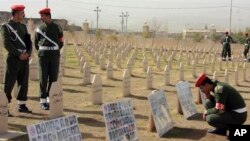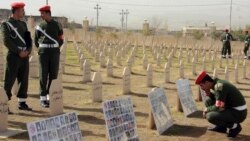Twenty-seven years ago, on March 16, 1988, the regime of then-President of Iraq, Saddam Hussein, committed one of the worst atrocities of the modern era: the murder by poison gas of thousands of civilians in the Kurdish-Iraqi town of Halabja.
As part of the al-Anfal operation, a genocidal campaign against the Kurds and other ethnic groups in Northern Iraq, government forces spent two days shelling the city of Halabja with rockets and Napalm, an incendiary gel that sticks to skin and causes terrible burns. But come early evening of the second day, March 16th, they suddenly changed tactics: attacking aircraft began to pepper the civilian parts of the city with canisters of chemical weapons including mustard gas and the nerve agents sarin, tabun, and VX.
That day, some 3,500 to 5,000 people died within minutes. Another 7,000 to 10,000 were injured, crippled, or suffered long-term health problems.
Although there is some evidence that Saddam Hussein's forces had used chemical agents before March 16, 1988, the attack on Halabja is thought to be the al-Anfal campaign’s first documented assault using chemicals. But it would not be the last.
Early in 1987, Saddam Hussein authorized the use of chemical weapons in attacks on as many as 24 Kurdish villages. For his role in these heinous attacks, the dictator’s cousin and the campaign’s commander, Ali Hassan al-Majid, earned the nickname Chemical Ali.
Al-Anfal was a series of horrific crimes perpetrated by Iraqi leaders against their own civilian population, and the gassing of the citizens of Halabja was that campaign’s worst atrocity.
For his part in it, and for other crimes, Chemical Ali was executed by hanging. The Iraqi Special Tribunal dropped charges against Saddam Hussein himself only because he was executed after being convicted in a separate case.
The head of government has a responsibility to the country, and to its people, to act in their best interest. Ultimately, few dictators die in bed, or exit the scene of their crimes gracefully. The fate of those who instigated the al-Anfal and killed thousands of innocents in Halabja, should serve as a warning to others who follow in their murderous footsteps.






